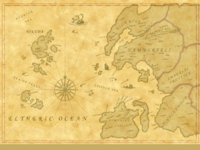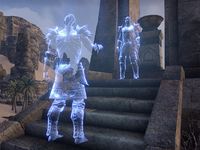Lore:Hattu Mountain
| Hattu | |
|---|---|
| Type | Mountain |
| Continent | Yokuda |
| Region | High Desert |
Hattu Mountain, sometimes called Mount Hattu[1] or "The Father of Mountains",[2] is a mountain in the High Desert province of Yokuda. It was notable for its onyx reserves and for being the place where Frandar Hunding wrote the Book of Circles.[3] Shortly after, a bloody conflict known as the War of the Singers took place at the foot of the mountain.[4][2] The mountain was inhabited by Hunding zealots during the mid-Second era.[3]
History[edit]
Prior to Yokudan rule, Hattu Mountain was believed to be under the control of the Lefthanded Elves, who built onyx mines at the very peak of the mountain. After their war with the Yokudans, these mines were seized from the Elves as spoils of war.[3]
Circa 1E 750 Frandar Hunding retreated to a cave on Hattu Mountain to live the life of a hermit while formulating his philosophy of the "Way of the Sword". These writings eventually became the Book of Circles, which he wrote over the period of 30 years.[2][5]
In 1E 780 his life of peace was interrupted by a group of sword-singers, including his son, who came seeking his leadership in what would become a war against the Emperor Hira.[4] Frandar wanted to negotiate with Hira in order to save the countless lives that would no doubt be lost in a war, a stance that Divad strongly disapproved of. Scribes of the time reported bright flashes of light and angry voices from within the cave as Frandar and Divad argued. After five hours both emerged from the cave and Frandar reluctantly agreed to lead the rebellion against Hira in what became known as the War of the Singers.[4]
Hunding devised a strategy he called the "Hammer and Anvil", and eventually won a decisive victory against the emperor at the foot of Hattu Mountain. Less than twenty thousand singers survived, but over three hundred thousand of Hira's army were killed.[2][6]
The second of the Ra Gada, the "Tavan" wave, so-called because it was spearheaded by the Hattu Metropoles brigade, who revered holy Tava, Lady of the Air.[7]
By the mid-Second era, the ancient onyx peak-mines of Hattu were still believed to hold vast riches, but were occupied by Frandar Hunding cultists, who made mining the gemstones difficult.[3]
Gallery[edit]
References[edit]
- ^ Throne Keeper Farvad's dialogue in ESO
- ^ a b c d Redguards, History and Heroes — Destri Melarg
- ^ a b c d Lefthander's Aegis Belt codex entry
- ^ a b c Divad the Singer — Destri Melarg
- ^ The Improved Emperor's Guide to Tamriel: Hammerfell — Flaccus Terentius, 2E 581
- ^ Sai Sahan's dialogue
- ^ Crafting Motif 28: Ra Gada Style — Lady Cinnabar of Taneth


